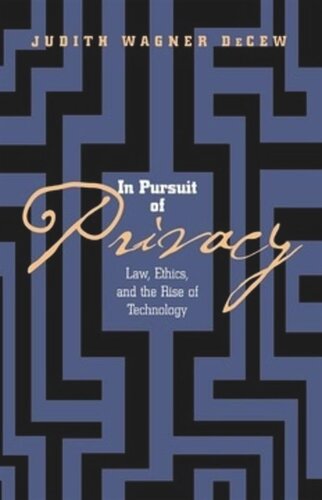

Most ebook files are in PDF format, so you can easily read them using various software such as Foxit Reader or directly on the Google Chrome browser.
Some ebook files are released by publishers in other formats such as .awz, .mobi, .epub, .fb2, etc. You may need to install specific software to read these formats on mobile/PC, such as Calibre.
Please read the tutorial at this link: https://ebookbell.com/faq
We offer FREE conversion to the popular formats you request; however, this may take some time. Therefore, right after payment, please email us, and we will try to provide the service as quickly as possible.
For some exceptional file formats or broken links (if any), please refrain from opening any disputes. Instead, email us first, and we will try to assist within a maximum of 6 hours.
EbookBell Team

0.0
0 reviewsJudith Wagner DeCew provides a solid philosophical foundation for legal discussions of privacy by articulating and unifying diverse arguments on the right to privacy and on how it should be guaranteed in various contemporary contexts. Philosophers and legal theorists tend either to define privacy narrowly or to abandon privacy as conceptually incoherent, she claims. In order to assess how far privacy should extend, and determine how the wide range of specific cases can be reconciled, DeCew surveys the history of the notion of privacy as it first evolved in American tort law and constitutional law and then analyzes current characterizations. In different contexts, privacy has been defined on the basis of information, autonomy, property, and intimacy. DeCew's broader claim is that privacy has fundamental value because it allows us to create ourselves as individuals, offering us freedom from judgment, scrutiny, and the pressure to conform. Feminist theorists often view privacy as a tool for shielding abuses. DeCew responds to this feminist critique of privacy, as well as addressing the issues of abortion and of gay and lesbian sexuality in the context of specific landmark legal cases. In discussions of Roe v. Wade, Bowers v. Hardwick, and the Hart/Devlin debates on decriminalization of homosexuality and prostitution, DeCew applies her broad theory to sexual and reproductive privacy, anti-sodomy laws, and the legislation and enforcement of morals. She finally discusses the intersection of privacy with public safety concerns, such as drug testing, and in light of new communication technologies, such as caller ID.